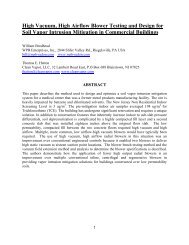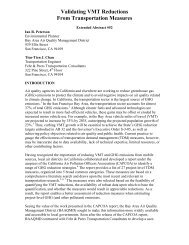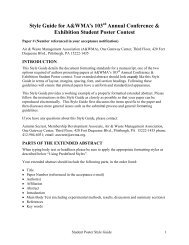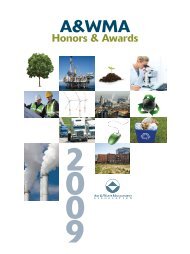Abstract Book
Abstract Book
Abstract Book
Create successful ePaper yourself
Turn your PDF publications into a flip-book with our unique Google optimized e-Paper software.
certainly favours the scalable attributes of fuel cell technology.<br />
• The availability of enough by-product hydrogen globally to generate 1,000 megawatts<br />
of power is another factor that can enable rapid penetration of fuel cell technology.<br />
• Furthermore, the notion of clean energy solutions working together in a complementary<br />
way is intriguing - this could, for instance, favour the use of fuel cells in combination<br />
with wind farms to enable energy ‘time shifting’ in order to better meet market demand<br />
for power.<br />
Learn how the fuel cell industry is working to accelerate market adoption by leveraging<br />
focused innovation, quality manufacturing expertise and an understanding of market<br />
trends and requirements.<br />
Biodiesel Production By Esterification Of Non-edible Oils (94)<br />
F. Halek, A. Hosseinnia, A. Kavousirahim; Materials & Energy Research Center, Tehran,<br />
Iran, Islamic Republic of<br />
Biodiesel fuels are attracting increasing attention worldwide as blending components or<br />
direct replacements for diesel fuel in vehicle engines. In this study, the non-food use of<br />
canola oil for biodiesel production was investigated. Non-food of canola, a native plant<br />
has recently become object of increasing interest. Biodiesel was produced from about 500<br />
g of canola oil (non-edible). The properties of methyl esters were determined by methods<br />
specified in the ASTM 6751. Several biodiesel production methods have been developed,<br />
among which transesterification using acidic catalyst gives high level of conversion of<br />
triglycerides to their corresponding methyl ester in short reaction time. The process of<br />
transesterification is affected by reaction condition, molar ratio of alcohol to oil, type of<br />
alcohol, type and amount of catalysts, reaction time and temperature and water content of<br />
oils. The optimum condition for the esterification process was molar ratio of methanol to<br />
oil at 10:1 with wt % of SO4H2 at 63 ºC under its own pressure with a retention time of<br />
60 minute. The yield amount of biodiesel was 93 wt % at the end of esterification<br />
process. The produced biodiesel was purified by neutralization with 0.1 M sodium<br />
hydroxide solution and water at a 50 ºC.<br />
Keywords: Renewable energy, Biodiesel, Canola, Non-edible oil, Esterification.<br />
Vancouver Landfill Gas Collection And Utilization (125)<br />
N. Steglich; City of Vancouver, Vancouver, BC, Canada<br />
The City of Vancouver owns and operates the Vancouver Landfill located in Delta. The<br />
Landfill operates in accordance with the Operational Certificate issued by the Ministry of<br />
Environment and under the provisions of the regional Solid Waste Management Plan.<br />
The Landfill is authorized to dispose of a maximum of 750,000 tonnes of municipal solid<br />
waste each year.<br />
Since 1991, the City has collected and flared landfill gas produced from the<br />
decomposition of organics in the garbage to reduce odours and greenhouse gas emissions.<br />
Since 2003, the City, in partnership with Maxim Power Corp., has beneficially utilized<br />
the landfill gas instead of flaring it.<br />
42












